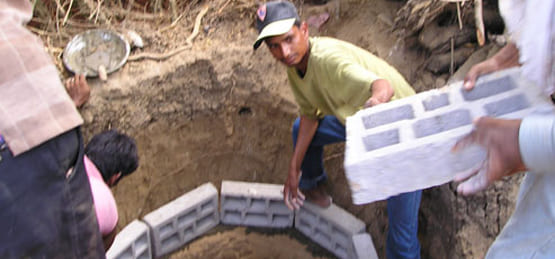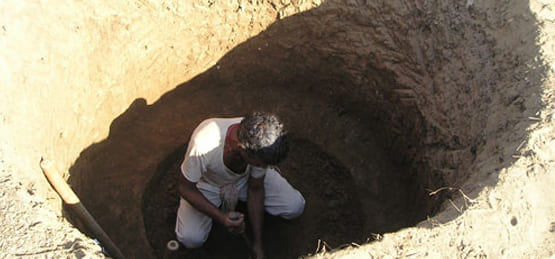Total Sanitation Campaign (TSC)

Total Sanitation Campaign (TSC)
In view of the loss of natural coverage (i.e. removal of bushes and other trees from the vicinity of the pond) and also due to the filling up of water therein, more than 150 families found it difficult for open defecation. Dr. Kiran Patel happened to visit the reconstructed pond and the villagers were reluctant to show him the pond due to heavy excreta on the embankments. In the past they had used the pond for answering the natural call, since they did not have toilet facilities or any capacity to build them on their own in view of the poor financial position and poverty ridden life. This incident had a touching effect on Dr. Kiran Patel and he wanted to do something to improve their situation and started discussing the matter with the concerned how toilets could be built for them.
However, there was some hesitation with the Adivasi people to change their habit of answering natural calls in open areas, as they never used toilets in the past and they had some misunderstandings and misconceptions of using closed toilets. They were also concerned about who would take care of the toilets and they also feared that it would create problems for the village womenfolk as someone could hide inside it. The debate continued for some time, as they discussed the pros and cons of the proposal. Dr. Kiran Patel then proposed building individual toilets for the families, which was also met with resistance in view of the finances involved in constructing individual toilets.

Ultimately, Dr. Patel prevailed upon them to construct the toilets with water sealed pan facilities by offering his financial support and cooperation and on the other hand soliciting the manual labor of the villagers from the beneficiaries. The water sealed pan facility was required for preventing the probability of fire due to the accumulation of gas inside the underground soak pits. Further, it was suggested to flush the pan with minimum water, a specially designed pan was introduced and shown them for experiment. And after having positive response from the beneficiaries, the Trust approached the Government for construction of the toilets under public-private partnership.
The government consented to give a grant of Rs. 600/- for 158 below poverty line (BPL) families out of 306 families who had no toilet facilities against the total cost of Rs. 2700/- per toilet. Dr. Kiran Patel , Dr. Dinesh Patel and Mr. Pradip Patel extended their help to meet the deficit.
As the construction of the toilets started, there was enthusiasm and tremendous support from the beneficiaries but the landlords and upper caste people of the village were not happy with this project. They were of the opinion that the poor must remain poor and if they became accustomed to such facilities, they would demand more facilities in future.
It was a stupendous task to create awareness amongst the beneficiaries and change their long time habits and persuade them to use the modern toilets built for them. Our representatives made a sincere efforts amongst the villagers, teaching them how to use the toilet and wash their hands after utilizing it by organizing street dramas, personal meetings, audio-visual programs and writing slogans on the boards erected in a public place in the village.
Now a time has come due to the upward mobility of the poor people, they are not ready for the cleanliness drive which they were doing in the past. In order to resolve this issue, Our female volunteers also went to housewives of landlords and upper caste people for awareness to promote cleanliness on their own. And thus, the housewives of the village started cleaning the village roads and bye lanes periodically.
All these activities led to the awareness of sanitation and cleanliness amongst the villagers. It also helped to prevent diseases such as cholera, typhoid, dysentery and pollution of the environment in the village, and prevented children from contracting earthworm, etc. During the last year, there was an epidemic of Chicken Gunia in almost all parts of the country, yet our village did not have a single case of not only Chicken Gunia, but even a simple fever or other minor diseases.
Some of the beneficiaries even performed spiritual rituals before using the toilets and made the village as a "Temple of Sanity ," thereby making a name and fame of Mota Fofalia in the state and the country for its spectacular total cleanliness drive with the participation of the people and encouragement and planning of our volunteers. As a result of this Herculean task carried out by the Trust, the village received the "Nirmal Gram Puraskar Award" from the President of India in 2006. Due to the better sanitary conditions prevailing in the village, the villagers could save money and time and use their energy towards constructive growth in their respective professions. The persons who originally opposed the project repented of their initial outbursts against the sanitation program and started cooperating with the program. Further, it has also narrowed down the mental barriers of forward caste and backward communities as they realized that unity is strength to achieve the overall progress of the village.
Due to the recognition received by the Mota Fofalia village and its success story, the Government of Gujarat advised other Village Panchayat heads and Self Helped Groups (SHGS) to visit and replicate different projects at their villages. In response to this, representatives from more than 1,200 villages have visited and been inspired from the work carried out by our Trust with the participation of the people. The Government of Gujarat has also recognized these activities under the dynamic leadership of our Chief Patron, Dr. Kiran Patel and honoured him with the highest civilian award of the State of Gujarat - "GUJARAT GARIMA - 2007"by Hon'ble Chief Minister of the State of Gujarat.
